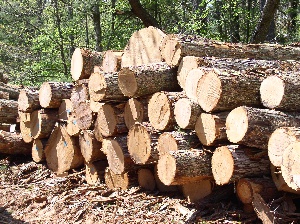Forestry officials say illegal chainsaw lumbering will persist for as long as perpetrators have ready market for their products.
Brong Ahafo Regional Manager of the Forestry Services Division, Thomas Okyere says despite modest gains in the fight against the practice, it would be difficult to eliminate such operations without a total ban.
A ban was placed on chainsaw lumbering in 1998 as part of efforts to check forest degradation. Five years down the line, the practice is still rampant in the forest belt of Ashanti, Brong Ahafo, Western and Eastern Regions of Ghana.
Not even the deployment of joint police-military task forces has scared perpetrators who sometimes armed themselves and exchanged fire with state security agents.
Mr. Okyere says though the Forestry Task Force has largely been able to clamp down activities of chainsaw operators, there is a lot to be done in order to win the war.
“Forestry, we have put measures in place and have brought down the tempo. Now with police-military patrols on board, with the Rapid Response Unit on board, we’ve been able to clamp down on these illegal chainsaw activities. But on the flip side of it, once we have timber markets still existing, those who are recalcitrant will prefer to cut and bring to the market,” Mr. Okyere said.
He describes as “very difficult” efforts to totally eradicate illegal chainsaw logging in the country despite presence of Anti-Chainsaw Task Force especially when District, Municipal and Metropolitan assemblies continue to enjoy from illegal chainsaw markets.
“District assemblies are taking taxes from these people, metropolitan assemblies are also taken; serving as job creation for these people. So it becomes very difficult eradicating the whole market entirely so what I prefer, is we have to find a way out to integrate the two”. Mr. Okyere explained.
Though anti-chainsaw law provides for accredited saw mills to supply the local market, at least, twenty per cent sawn lumber, it has not been adhered to.
Mr. Okyere however, believes extension of a pilot project to allow accredited chainsaw operators to get wood from timber firms will help reverse the trend.
“Where are even the saw-millers? They are all collapsing. For lack of raw materials, they are all collapsing. So this 10%; 20 per cent that we talked of, it is not working for now. The companies are interested in dollars,” Mr. Okyere lamented.
Tropenbos International Ghana is undertaking the project in some selected regions including Ashanti and Bono Ahafo regions.
Under the EU Chainsaw project, communities are provided with artisanal mills to process raw materials acquired from legal sources through a partnership arrangement between chainsaw-dependent communities and forest concession holders.
“The main alternative to this menace is at least to go by what Tropenbos is doing at the moment, equip them with this simple, simple machinery. They can go into it and feed the local market at a cheaper price,” Mr Okyere noted.
Click to view details



Business News of Wednesday, 4 September 2013
Source: Joy Online

















